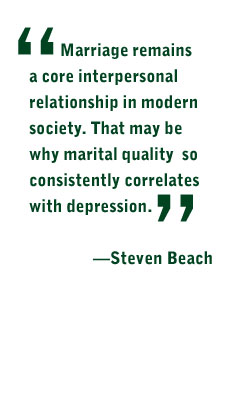


Depression and Marital Strife: Dealing with a Double Whammy
by Lindsey Scott
Intro
| An Age-Old Question: Chicken or Egg
| New Directions


New Directions
It is well known that serotonin — a brain chemical that controls mood, sleep, sex- uality and appetite — is associated with depression, or freedom from it, and researchers have recently discovered a number of genetic links that may help explain differences in the way people respond to marital distress and other difficulties.
“Some forms of the genes are associated with greater changes in this neurotransmitter system when an individual is confronted by a stressful set of circumstances,” Beach said. “If I have those forms of the genes, I’m going to be at an elevated risk for depression compared to someone facing the same set of stressful events but who has the other form of the gene.”
With this new information, Beach believes it will be possible to help people at genetic risk for depression become more resilient by building stronger relationships. “Teaching people different strategies for avoiding stress and developing supportive relationships,” according to Beach, “should protect them from toxic stress and create a context that doesn’t allow an underlying genetic predisposition toward depression to express itself.”
hese new genetic findings may also help confirm and extend old-fashioned common sense. By encouraging couples to build more supportive connections with each other as well as with other people and to acquire techniques for reducing the level and the intensity of certain stresses, perhaps it is possible to reverse the processes that are leading to higher rates of depression in all modern societies, Beach said.
Depression Symptom Checklist
Steven Beach, a psychologist at the University of Georgia, has provided a short checklist to help determine whether or not a person is suffering from depression. However, he notes that checklists are only screening tools and cannot diagnose depression.
Step 1:
Check off any symptoms you have experienced on a regular basis over at least the past two weeks:
• Constant sadness
• Lack of motivation
• Irritability
• Trouble concentrating
• Feelings of isolation, reduced involvement with family and friends
• Loss of interest in favorite activities
• Hopelessness
• Feelings of worthlessness or guilt for no particular reason
• Thoughts of death or suicide
• Fatigue
• Low energy
• Insomnia
• Significant weight change
Step 2:
Do your symptoms affect your ability to be yourself and function on a daily basis?
(For example, do they prevent you from interacting with family and friends or enjoying your favorite hobbies or activities?)
Yes, my symptoms affect my daily functioning.
No, my symptoms do not affect my daily functioning.
If you have four or more symptoms in Step One, and answered “yes” in Step Two, you may want to see a professional to be evaluated or share the results with your physician. But remember, this is just a screening tool and cannot diagnose depression. Because other medical conditions may cause similar symptoms, only a health care professional can diagnose depression.
For more information, access the Institute for Behavioral Research at www.ibr.uga.edu, or email Steven Beach at sbeach@egon.psy.uga.edu.
Intro
| An Age-Old Question: Chicken or Egg
| New Directions
For comments or for information please e-mail: rcomm@uga.edu
To contact the webmaster please email: ovprweb@uga.edu
![]()